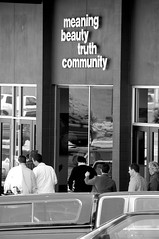
What a great day in Seattle. The temp was nice, the sun was out, and day two of the the Reform & Resurge conference was fantastic. I'll go speaker by speaker with a few brief (it's really late and I'm really tired) comments. All quotes are as exact as can be after trying to understand my fast and sloppy writing. You may not understand the context of something, but consider yourself blessed for what you do understand. :)
First up, the second and final session taught by Ed Stetzer. Much came from his new book Breaking the Missional Code (see Driscoll's new interview with Stetzer about his new books). I won't give all the info, including a couple sets of lists. But I will say the first list includes 10 shifts for moving people toward culture and the second includes steps to understanding culture. Good stuff. He also gave good advice on how to get beyond demographics in knowing culture.
Josh Harris followed Stetzer and talked about a "humble orthodoxy." It was very good. I've heard Josh speak before and I always learn much from him. He taught from 2 Timothy 2:14-26, 1. Teach the truth faithfully, 2. Live the truth faithfully, and 3. Represent the truth humbly.
Quotes: "We are to avoid controversy that distracts people from the gospel." "Living Truth becomes a living lie when we don't embody it ourselves." "You should be suspicious when the voice in your head says, 'You don't need counsel on this decision.'"
Tim Keller gave the other two messages of the day. The first was on "Being the Church in Our Culture." He provided a paper/article for the talk. Here's his six-fold model for the church relating to culture. They can read as one sentence.
1. More Christians living long-term in cities
2. ...With a better understanding of the gospel
3. ...Living as dynamic counter-cultures in the city
4. ...Integrating their faith and their work
5. ...Radically committed to the good of the city as a whole
6. ...Contextualizing the Gospel message
Quotes: "Christians are to be alternate cities in every city." "People in our churches need to understand the theological meaning of ordinary work." "We are taught how to raise up church leaders, not culture leaders." "Christians are supposed to live in the city as a counter-culture, but are not supposed to take power." "Unless you are radically like [the culture] and radically unlike [the culture], they are going to shrug."
Keller's second talk was on "Preaching the Gospel." He said you can understand the Bible diachronically (through the story) or synchronically (topically). Some new evangelicals try to focus on the former, older evangelicals on the latter, but both are needed. He focused on the Gospel as the agent of change in both unbelievers and believers as it tears down our idols and leaves us with Jesus.
 Both talks by Keller were excellent and well received. I was able to ask about suburban/rural incarnational ministry during QnA, since he focused on urban ministry. I was also able to talk with him after the last session. He speaks again in the morning.
Both talks by Keller were excellent and well received. I was able to ask about suburban/rural incarnational ministry during QnA, since he focused on urban ministry. I was also able to talk with him after the last session. He speaks again in the morning.
I had the chance to meet Mark Horne and Dan Cruver today, and shared lunch with several friends I mentioned yesterday plus Drew Goodmanson. Drew is a great guy and an elder at Kaleo in San Diego who knows more about the internet than the founder, Al Gore. I had a nice chat today with Shaun Garman of Red Sea Church in Portland. Shaun is a godly young pastor who we first met at the Acts29 conference in Dallas last year. I also had a brief 'hello, love your books' with Donald Miller after he showed up for Keller's first talk.
I've met several guys who recognized me from this blog and decided to
say 'hi.' I love making these sorts of connections, and many of these
guys seem to find my blog because they are looking for Tim Keller resources. One of those guys is Darren Larson from Wheaton, IL. He only lives an hour from me but we meet for the first time in Seattle. Strange world. Check out his blog.
I failed to mention yesterday that I talked for some time with Scott Thomas, who has been the Acts29 replanting guy and is now heading up the whole dealio. Very cool for everyone because Scott is a great guy. He always listens like you are the most important guy in the world and has great penetrating questions and insights. We hope to talk more with him tomorrow. Read a great "replanting" article by Scott.
FYI, I believe the conference audio and video will be available for free at some point on the Resurgence site. How cool is that?








